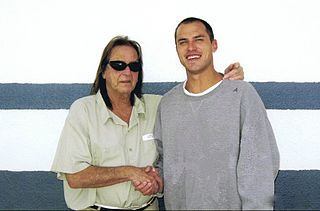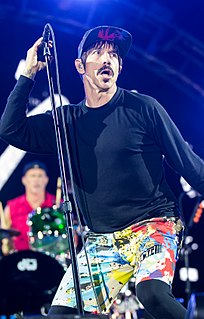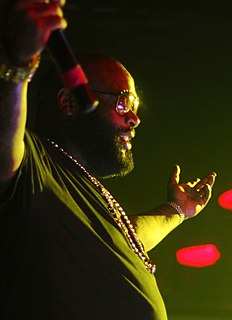A Quote by Maia Szalavitz
I also had my own addiction to cocaine and heroin in my 20s. I knew that it was driven not by the things that the drug workers were telling me; in fact, I couldn't believe any drug information that was given to me by authorities because I knew from my own experience that it was wrong.
Related Quotes
I think the addiction stuff, because I was already sort of outed in my family as a sexual person: as a sexually-adventurous and sexually-conflicted person and sexually-driven person. They already knew that about me. They knew that about me when I was eleven. My parents very consciously tried to provide an environment that would protect me from becoming a drug addict.
Looking at the data and at my drug use and evaluating it carefully just let me see that I wasn't special, but my drug use challenged what I thought about cocaine. Because I would accept when I would say, "What happened to that person?" and someone would say, "They started using cocaine...they went downhill..." I would just accept that, even though I had a different experience and all these other people had a different experience. But I would throw that out because I thought my experience was an aberration.
I think about my cocaine use. I liked it. I thought it was a great drug. But I knew that if I was doing that almost exclusively, I wouldn't be able to continue to also have significant others and a wide range of other things. And I wasn't special. A number of people, including the people I was doing cocaine with, also behaved the same way.
I thought cocaine was a fantastic drug. A wonder drug, like everybody else. It gave you [an] energy burst. You could stay awake for days on end, and it was just marvelous and I didn't think it was evil at all. I put it almost in the same category as marijuana, only hell of a lot better. It was a tremendous energy boost. It gave the feeling, a high, but nobody knew, well maybe a small percentage of people knew. But eventually everybody knew how evil it really was.
I had to sit with my senses. This clear, beautiful intuition took over. I knew exactly how I felt, and I wasn't confused or clouded or compromised. I realized that none of my feelings had diminished, but I might have to lose someone I truly loved. I didn't want to run away from Claire, but I knew drug addiction was strong enough that I had to be willing, if need be, to let go of the person I'd just fallen in love with.
The Coen brothers: Of all the directors I've worked with, they're the only ones who have given me the storyboards attached to the script. It was very cool for me, because I knew when I was in close-up or if it was far away, and it also made me know that anything that happened in the edit wasn't personal. Because they edit their own movies, so they were editing it as they went.
Anyone who grew up in the crack era - you know, I grew up in that era - knew that there were also people out - and there are still guys to this day that are out there, you know, obviously drug dealing - but those were the guys who had access and had money. And some of those guys felt responsible to create opportunity for other people and were also aware of the dangers of their work and often aren't really the ones that are encouraging kids to get into drug dealing.
[T]he truth is that drug addicts have a disease. It only takes a short time in the streets to realize that out-of-control addiction is a medical problem, not a form of recreational or criminal behavior. And the more society treats drug addiction as a crime, the more money drug dealers will make "relieving" the suffering of the addicts.
I was incredibly confident on stage because that's where I loved to be. But offstage, there was no balance. I was a little shy kid that went onstage. And I always said, cocaine was the drug that made me open up. I could talk to people. But then it became the drug that closed me down. So it started out by making me talk to everyone, and then ended up by me isolating myself alone with it; which is the end of the world, really.
Drug addiction is an incredibly difficult challenge to manage on one's own. When I think of all the stories I've heard from people, the common denominator is that they all were ultimately able to find somebody who was willing to support them. Maybe it was someone they knew, like a parent or a sibling or a friend; other times it was a treatment center with a compassionate staff who didn't give up on them. That made all the difference.
I played a major role in the spread of crack cocaine, the marketing of crack cocaine, the glamorization of crack cocaine. But it's hard to say that it was totally my fault. My judge in Cincinnati told me, "Mr. Ross, I know that the prosecutor and the media and the DEA all want to blame you for this problem, but I sentenced my first drug dealer the year you were born, so I know you're not the cause. This is a problem we've had since before you were born."
































